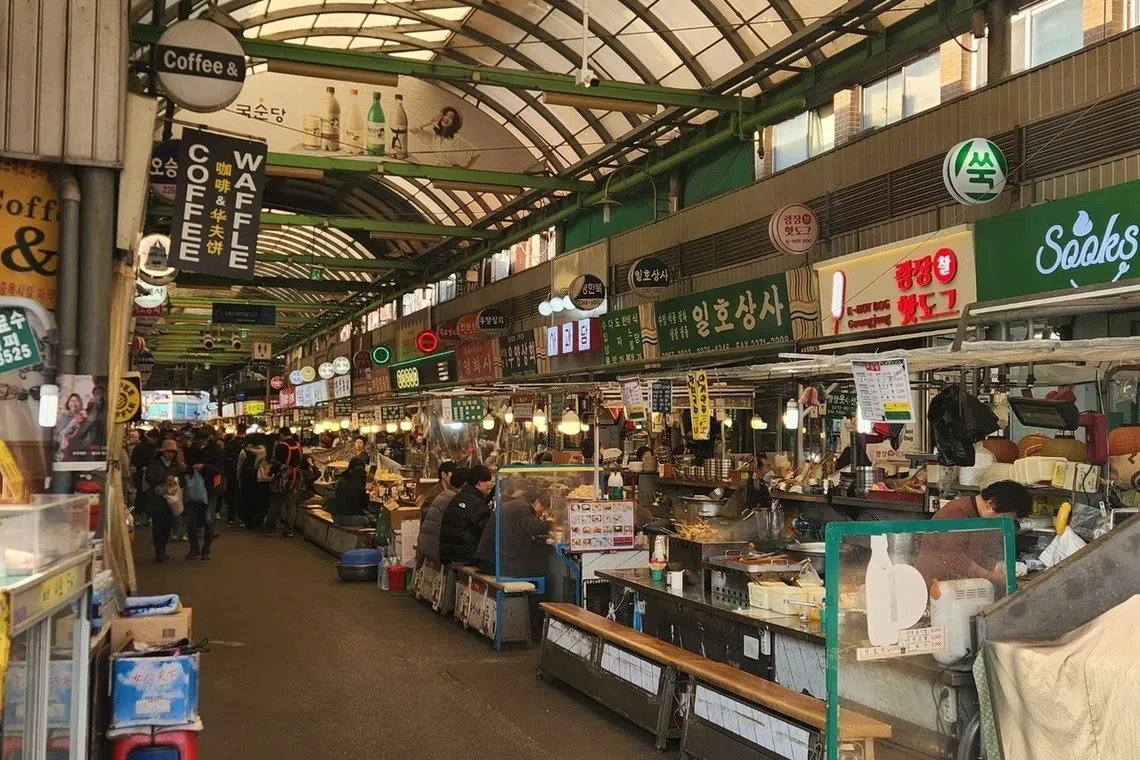Viral overcharging scandal at Seoul’s Gwangjang Market escalates into fight among merchant groups
Sign up now: Get insights on Asia's fast-moving developments

Merchant groups of Seoul's Gwangjang Market have gone into a legal battle due to a viral overcharging scandal.
PHOTO: JONGNO-GU OFFICE
Follow topic:
SEOUL – A controversy over alleged overcharging at Seoul’s tourist-favourite Gwangjang Market has escalated into a legal battle among its merchant groups.
According to local media reports on Nov 23, the Gwangjang Market Merchants’ Association plans to file a lawsuit seeking 300 million won (S$266,500) in damages from the similarly named Gwangjang Traditional Market Merchants’ Association.
The former represents some 200 stores located inside the main Gwangjang Market building. The latter oversees roughly 250 stalls, including food stalls that made the market a foodie destination, and small shops in the adjacent Gwangjang Traditional Market area.
Although the two markets are managed separately, most visitors perceive them as a single destination – a factor the plaintiffs say has caused confusion and financial fallout.
Store owners within the main Gwangjang Market claim the scandal – originating from food stalls outside their jurisdiction – has unfairly damaged their reputation and reduced foot traffic, resulting in significant financial losses.
How the controversy began
The dispute stems from a viral overcharging scandal that broke out in October. On Oct 4, a popular YouTuber uploaded a video alleging that a stall merchant had charged her more than the price listed on the menu and treated her rudely after she ordered sundae, a Korean blood sausage dish.
“It says 8,000 won here, why 10,000 won?” the YouTuber asks in the video.
“I added in extra meat, didn’t I?” the merchant refutes.
The clip spread quickly online, fuelling public criticism of the market’s service and pricing practices. The merchant pushed back in a subsequent media interview, claiming that the YouTuber had agreed to extra meat but later turned hostile.
“After eating, when I told them it was 10,000 won, they tried to attack me as if I were a rat,” the merchant said.
“I just told them to pay 8,000 won and sent them away,” she added. The merchants’ association, representing the stalls, further alleged that the YouTuber had visited with malicious intent to film a confrontational scene.
The YouTuber, however, disputed these claims and said she could provide proof of transferring 10,000 won to the stall.
“I visited five stalls that day and four were rude,” she said. “I saw merchants suddenly yelling at foreigners.”
“If it were an issue with individual stores, I would have edited it out, but I posted because I think it’s a chronic problem with the Gwangjang Market,” she added. The original video has since surpassed 16 million views.
Following the backlash, the traditional market association imposed a 10-day business suspension on the stall.
A deepening divide
Public opinion largely sympathised with the YouTuber, and subsequent comments and posts said they had gone through similar experiences.
“I know that stall. I fell victim too,” one comment read.
“Gwangjang Market is the worst. Let’s lead tourists to a different market,” read another post on X.
The Gwangjang Market Merchants’ Association (from the main market area) collected signatures from over 200 members before sending a formal demand for compensation to the neighbouring merchant group on Nov 13. The stall merchants’ association has not yet issued an official response.
“Our names are similar, so many people call our office to complain. It feels a bit unfair,” a Gwangjang Market Merchants’ Association official told Yonhap.
The Gwangjang Traditional Market Merchants’ Association official responded, saying the group would take necessary actions if litigation proceeded.
Meanwhile, the Jongno-gu Office, which oversees the market area, confirmed it has spoken with both associations. However, it noted “it was not at the level to interfere because actual litigation is not in progress”.
The district said in a separate statement that it plans to implement a real-name verification system for merchants by the end of 2025, connecting stall operations to a registered owner. THE KOREA HERALD/ASIA NEWS NETWORK

